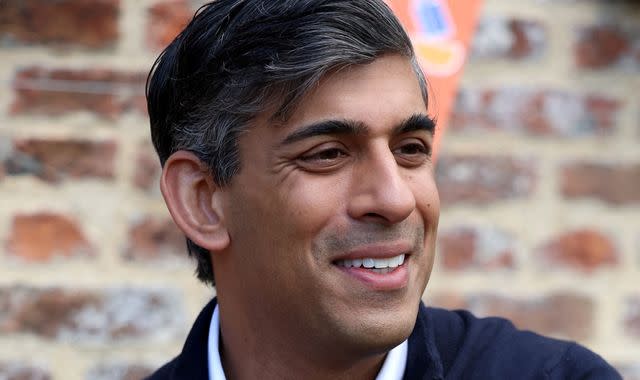Sunak ally Stride does his boss no favours in response to question about PM's future

It was a question you don't expect to hear being asked of a senior cabinet minister during an election campaign.
In fact, the last time doubts were raised mid-campaign about whether a beleaguered party leader would make it to polling day was more than 40 years ago.
This time, discussing Rishi Sunak's D-Day fiasco on Sky News, Trevor Phillips asked Mel Stride: "Is he going to lead you into this election?"
Election latest: Tories accused of putting policy through 'desperometer'
At least the work and pensions secretary - one of the PM's closest allies - answered in the affirmative.
"Absolutely," he replied. "And there should be no question of anything other than that."
But the question has been raised. And by answering it as if it was a fair question rather than brushing it aside, the hapless Mr Stride has done his close friend the PM no favours at all.
In their exchange, Trevor put it to Mr Stride: "Whatever Mr Sunak's virtues as an administrator, I think lots of people will have looked at that and said, this is the wrong man at the wrong time.
"Would it not be a courageous and moral act for him to announce that he knows he's leading his party to defeat, partly because of his own actions and his own shortcomings and that he will now step aside to save seats which won't be saved if he stays for the next four weeks?"
Why has the question been raised? It followed a tweet by Nadine Dorries, who speculated: "I have always said that Cameron was popped into the Lords and into a senior ministerial post for a reason. I thought maybe it was to replace Sunak at an earlier stage."
And then she added mischievously: "Rumours around tonight that Sunak's about to fall on his sword. There are no MPs - only ministers. If Sunak does resign, any replacement would have to come from within ministerial ranks."
Fall on his sword? No prime minister in modern times has ever quit or been forced out during an election campaign. And unless Mr Sunak went voluntarily - extremely unlikely - it's obviously too late to change leader now parliament is dissolved.
For instance, there are no officers of the 1922 committee to oversee a change, even if a successor was unopposed, as Mr Sunak was when Liz Truss self-destructed. The committee's inscrutable and famously discreet chairman Sir Graham Brady is not contesting the election.
The remaining members of the '22 exec, traditionally known as "the men in grey suits" who according to political folklore had the power to hand a failing party leader "a glass of whisky and a pearl-handled revolver in a darkened room", are in their constituencies fighting to hold their own seats.
But the fact that a change of leader is even being suggested - albeit by the maverick Boris Johnson cheerleader Ms Dorries - reveals two things about the current election campaign.
Read more:
Sunak pledges to cut rising costs of benefits
Labour promises thousands of new prison spaces
👉 Click to subscribe to the Sky News Daily wherever you get your podcasts 👈
One, it confirms just how serious Mr Sunak's D-Day blunder was. It's being described as potentially the defining mistake of this election campaign.
And two, it means that even if he limps towards 4 July as Tory leader, he's on borrowed time.
As for Labour, its rulebook, updated after the death of John Smith in 1994, is clearer. If the leader is "incapacitated" for whatever reason, the deputy leader - currently Angela Rayner - takes over until an election can be held.
The last time doubt was cast during an election campaign about whether a party leader would continue until polling day was in 1983 when Michael Foot was leading Labour to a massive defeat by Margaret Thatcher.
At an early morning news conference at Transport House, then home to the Labour Party and the Transport and General Workers' Union, Labour's general secretary Jim Mortimer astonished political journalists.
"The unanimous view of the campaign committee is that Michael Foot is the leader of the Labour Party and speaks for the party," he said, unprompted. Really? The journalists in the room sat in stunned silence, scarcely believing what they'd heard.
It was the TV broadcaster Clive James, then writing for The Observer, who was the quickest to react. "Oh," he said. "So there was some debate about it, was there?"
I remember it vividly, because I was there. I recall Mr Mortimer saying: "We've had a meeting and we're all agreed: Michael's the leader."
In that election, Margaret Thatcher won a majority of 144 seats. The Tories will hope that after the D-Day catastrophe, Mr Sunak isn't leading the Conservatives to a defeat as big as that in 2024.

 Yahoo News
Yahoo News 
